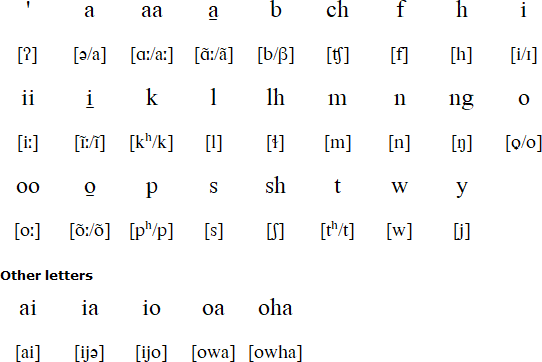Chickasaw is a Western Muskogean language spoken in south central Oklahoma in the USA, particularly in Byng and Happyland near Ada. In 2019 there were 50 speakers of Chickasaw. The majority of the speakers are over 50 years old: the younger generation are drifting towards English.
Chickasaw is closely related to Choctaw, although they are not mutually intelligible
During the 17th and 18th centuries Chickasaw was used as a lingua franca among all the tribes of the lower Mississippi river. The Chickasaw were one of the five Civilized Tribes forcibly removed to Indian Territory (now Oklahoma) in the 1830s. The other Civilized Tribes are the Cherokee, Choctaw, Creek and Seminole.
In the 19th and 20th centuries, many Chickasaw children were educated in government-run boarding schools where they were forbidden from speaking their own language. Even in schools run by the Chickasaw the children were encouraged to speak English rather than Chickasaw. As a result, the number of Chickasaw speakers declined rapidly.
In 2007 the Chickasaw Language Revitalization Program was set up to teach and promote Chicksaw in various ways. There are master-apprentice programs, community programs, classes for children and adults and immersion camps. They are also publishing books and other resources to help people learn the language.
Chickasaw was rarely written before the 20th century, and when it was, each writer used their own spelling system. There are currently two spelling systems for Chickasaw: the Humes alphabet and the Munro-Willmond alphabet.
The Humes alphabet was devised by the Reverend Jess J. Humes and his wife Vinnie May (James) Humes. It first appeared in A Chickasaw Dictionary, which was published in 1973. This was the first dictionary of Chickasaw.
The Munro-Willmond alphabet was created by Pam Munro, a linguist at UCLA, and Catherine Willmond, a native speaker of Chickasaw. In appears in their 1994 Chickasaw: An Analytical Dictionary (Chikashshanompaat Holisso Toba'chi). It appears below.

Download an alphabet chart for Chickasaw (Excel)
Himmaka' nittakookano hattak yokasht toksalicha'nikat ki'yo. Hattak mómakat ittíllawwi bíyyi'kacha nanna mómaka ittibaachaffa'hitok.
All human beings are born free and equal in dignity and rights. They are endowed with reason and conscience and should act towards one another in a spirit of brotherhood.
(Article 1 of the Universal Declaration of Human Rights)
Information about Chickasaw | Numbers
Information about the Chickasaw language
http://en.wikipedia.org/wiki/Chickasaw_language
https://www.ethnologue.com/language/cic
https://anompa.chickasaw.net/anompa/index.html
http://www.native-languages.org/chickasaw.htm
http://www.linguistics.ucsb.edu/faculty/gordon/chickasaw.pdf
https://www.chickasaw.net/Our-Nation/Culture/Language.aspx
The Official Site of the Chickasaw Nation
http://www.chickasaw.net
Chickasaw History - history of the Chickasaw
http://www.tolatsga.org/chick.html
Chickasaw Historical Documents
http://www.chickasaw.biz
Alabama, Chickasaw, Choctaw, Koasati, Mikasuki, Muscogee (Creek-Seminole)
Languages written with the Latin alphabet
Page last modified: 17.05.22
[top]
You can support this site by Buying Me A Coffee, and if you like what you see on this page, you can use the buttons below to share it with people you know.

If you like this site and find it useful, you can support it by making a donation via PayPal or Patreon, or by contributing in other ways. Omniglot is how I make my living.
Note: all links on this site to Amazon.com, Amazon.co.uk
and Amazon.fr
are affiliate links. This means I earn a commission if you click on any of them and buy something. So by clicking on these links you can help to support this site.
[top]